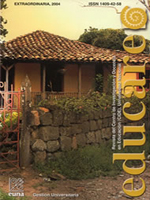Panorama de la gestión de la calidad académica universitaria
DOI:
https://doi.org/10.15359/ree.2004-Ext.3Abstract
Practical analysis of the role played by the staff in charge of the university's academic management. Three aspects are covered. First, a strategic view to discuss the Knowledge Society, the profile required of alumni in the work market and the European policy concerning Higher Education. Second, an outlook on quality, based on the management model from the European Foundation of Quality Management and the Deming cycle: planning, doing, measuring and improving. And finally, the stimulating role of academic management in developing an institutional pedagogical model to be applied in study programs, in the different teaching and learning methods, and developing an atmosphere of academic quality. The model is the result of exchanges carried out among coworkers of Universidad Nacional in the workshops organized by the MHO project Developing Institutional Quality , and also through other Dutch experiences.
References
CEPAL. (2000) América Latina y el Caribe en la Transición hacia una
Sociedad del Conocimiento.
CHEPS (1999). From the Eye of the Storm, Higher Education's Changing Institution Holanda, University of Twente.
Club Gestión de Calidad. (1999). Método para mejorar la calidad de la
educación superior basado en el modelo de la EFQM. Madrid.
Courtright, C. y San Sebastián, C. (1999). Estrategia para la creación de una sociedad de aprendizaje. http://www.conectando.org.sv/Estrategia/index.htm
CSUCA. S.f. Acreditación: Documentos de SICEVAES.
EFQM: 'Introducción a la Excelencia' y 'Conceptos fundamentales de la
Excelencia', www.efqm.org.
James, P. (2001) Gestión de la Calidad Total, Un texto introductorio, Madrid. Pearson Educación
MatiruB;A. Mwangi yR. Schlette. (1995). Teach your best,AHandbookfor University Lecturers, German Foundation for International Development (DSE).
Nava, V.M. y Jiménez, A. R. ISO 9000:2000, Estrategias para implantar
la norma de calidad para la mejora continua. México. Limusa.
Picardo, O. J. Pedagogía informacional: enseñar a aprender en la sociedad
del conocimiento. El Salvador. Universidad Francisco Gavidia,
Quesada, M. A.; Cedeño, M. A. y Zamora, J. M. (2001). El diseño curricular en los planes de estudio: aspectos teóricos y guía metodológica. Heredia. Editorial Universidad Nacional.
Sociedad del Conocimiento. www.sociedaddelconocimiento.net
Universidad Nacional. (2002). Significados de Elementos. Taller Una visión compartida de la docencia en la Universidad Nacional. Heredia.
Universidad Nacional. (2003). Los estudiantes en elfaturo escenario de la Universidad Nacional. Memoria. Heredia.
Universidad Nacional. (2004). Plan Global Institucional 2004-2014. Heredia.
Universidad Politécnica Rótterdam. (2003) Positionpaper 2003 - 2007.
www.hogeschool-rntterdam.nl.
Zamorano. s.f. Aprender haciendo. http://www.zamorano.edu/estudios/index:html
Published
How to Cite
Issue
Section
License
1. In case the submitted paper is accepted for publication, the author(s) FREELY, COSTLESS, EXCLUSIVELY AND FOR AN INDEFINITE TERM transfer copyrights and patrimonial rights to Universidad Nacional (UNA, Costa Rica). For more details check the Originality Statement and Copyright Transfer Agreement
2. REUTILIZATION RIGHTS: UNA authorizes authors to use, for any purpose (among them selfarchiving or autoarchiving) and to publish in the Internet in any electronic site, the paper´'s final version, both approved and published (post print), as long as it is done with a non commercial purpose, does not generate derivates without previous consentment and recognizes both publisher's name and authorship.
3. The submission and possible publication of the paper in the Educare Electronic Journal is ruled by the Journal’s editorial policies, the institutional rules of Universidad Nacional and the laws of the Republic of Costa Rica. Additionally, any possible difference of opinion or future dispute shall be settled in accordance with the mechanisms of Alternative Dispute Resolution and the Costa Rican Jurisdiction.
4. In all cases, it is understood that the opinions issued are those of the authors and do not necessarily reflect the position and opinion of Educare, CIDE or Universidad Nacional, Costa Rica. It is also understood that, in the exercise of academic freedom, the authors have carried out a rogorous scientific-academic process of research, reflection and argumentation thar lays within the thematic scope of interest of the Journal.
5. The papers published by Educare Electronic Journal use a Creative Commons License:














 The articles published by Educare Electronic Journal can be shared with a Creative Commons License:
The articles published by Educare Electronic Journal can be shared with a Creative Commons License: 



